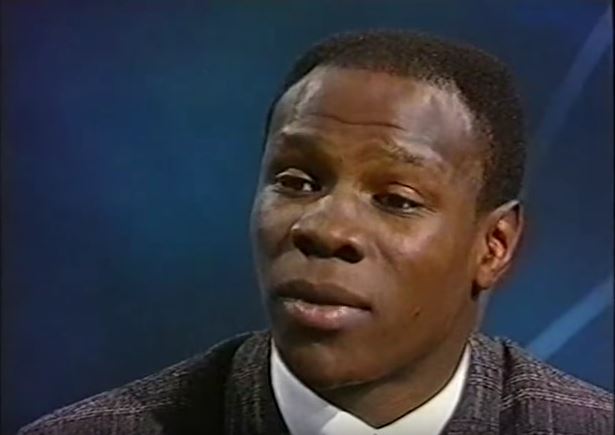By Dee Boulton
Christopher Livingstone Eubank Senior, genetic freak extraordinaire, impresses as per usual this time with his theories regarding how he made it in boxing, his early relationship with a certain Mike Tyson, how he mastered boxing, and much more.
‘It works like this,’ said the former WBO middleweight and super-middle champ. ‘If you don’t have one hundred amateur fights or ten years as an amateur, international and so on, or aren’t naturally gifted with punching power and spatial awareness, then you can only make it to the top in boxing by being a thoroughbred; of which I was thanks to my slave-bred ancestry.
‘Think of the Chinese weightlifters. From the age of ten in China they all weight-lift for hours daily, filling all the halls, and the process is simply weening out the weak. Those with the genetics not to fall by the wayside remain, and pick up the medals for China.
‘The biggest talent pool for boxing was New York City in the eighties. They forced you to spar seven days a week, to ween out the weak. After three and a half years straight there, I was the last man standing. If it wasn’t for my manager Adonis Torres passing in 1987, I would’ve continued my career there as the golden boy. But as the saying goes: If you can make it in New York, you can make it anywhere.
‘I came to the United Kingdom and there was this furnace of extreme talent at middleweight, hungry second generation Windrush. It was very scary. Michael Watson, Nigel Benn, Herol Graham, Rod Douglas, Johnny Melfah, Errol Christie – I couldn’t believe what I was seeing. I had conviction and resolve however, a burning flame in the pit of my solar plexus; relentless training seven days a week, (and) streamlining the whole repertoire.

‘It was about who was going to step up and be the man they said they were. I was resolute enough and had enough constitution and ability to be the last man standing, of which I was; making the United Kingdom the Mecca during the three and a half years Tyson was incarcerated.
‘When I visited Mike after the rematch with Benn, at the correctional facility, he told me there was no other fight he’d of been interested in being ringside for in boxing; but he wished he could of been ringside for that fight.’
Senior on meeting Tyson:
‘I remember Mike when he was 16, but first befriended him properly when I attended the grand opening of Versace on Madison Avenue the day before either my fight with Cronin or Contreras, one or the other, with baby Christopher; I had my contacts in New York.
‘I walked past Stallone to shake Mike’s hand and he held Junior. I had this quite stern attitude at 23, feeling actors represented a fakery and feeling Tyson was the realest deal. But regret not getting to meet Sly then too.’
Post-Watson:
‘Why did I continue to fight after Watson II? I had a wife and children and expensive mortgages, and didn’t know another way of life or job of work.
‘Plus, I had a talent. If you have a talent, what good is it if you don’t show it? They say nobody really moved like me; going both ways with what people might say was the grace of a ballet dancer, using pace control and able to posture or strut on the big stage when the pressure was cooking; cucumberic composure come crunch time.’
Senior on Watson Fight:
‘The pressure going into Watson II was unbelievable. It was the peak of Fleet Street and they used their ink to portray me to an entire nation as something of which I was not.
‘I was made out to be a villain; a nasty, horrible, arrogant low-life. So if I lost the fight, I felt it would be believed forever that I was just that, and I was simply not. I was in fact the opposite.
‘Watson comes out to ‘Momma Say Knock You Out’. The pressure has just gone to another stratosphere, because I know for a fact his mother would never say that and would hope the other boy her son was fighting was okay.
‘And my whole thing had always been the resolve I had that I couldn’t be knocked out, I wouldn’t be knocked out. But imagine if he did, it was possible. And he nearly did, of course. It came down to who was going to step in and take the fight, in the end.’
Senior on OG Greatness:
‘When I was world champion, I took 36 hours off after a fight. That was it. Sparring was right up to the day before the fight, unless severely injured. I always fought injured in some manner because it would be impossible not to, being a full-contact sport.
‘I fought every seven weeks and trained seven days a week; twenty-eight fights in five and a half years from 1990 to September 1995, 95% of which 12-rounders, when I finally lost fair and square in my 47th bout.
‘That’s an average of six fights a year. Not one fight every six months. Not even the great Joe Louis was as active a world champion – effectively I stood on those broad shoulders of Joe Louis to see further than I could. I don’t think today’s champions would get past one fight, they’d likely lose to a top ten contender or mandatory challenger seven weeks after a 12-round world title win; I did it 20 times in a row.
‘I was unrelenting in my task to keep breaking records and setting standards; always maintaining gentlemanly conduct, to push that to the youngsters and even the world at large, which was my passion, and still is.’